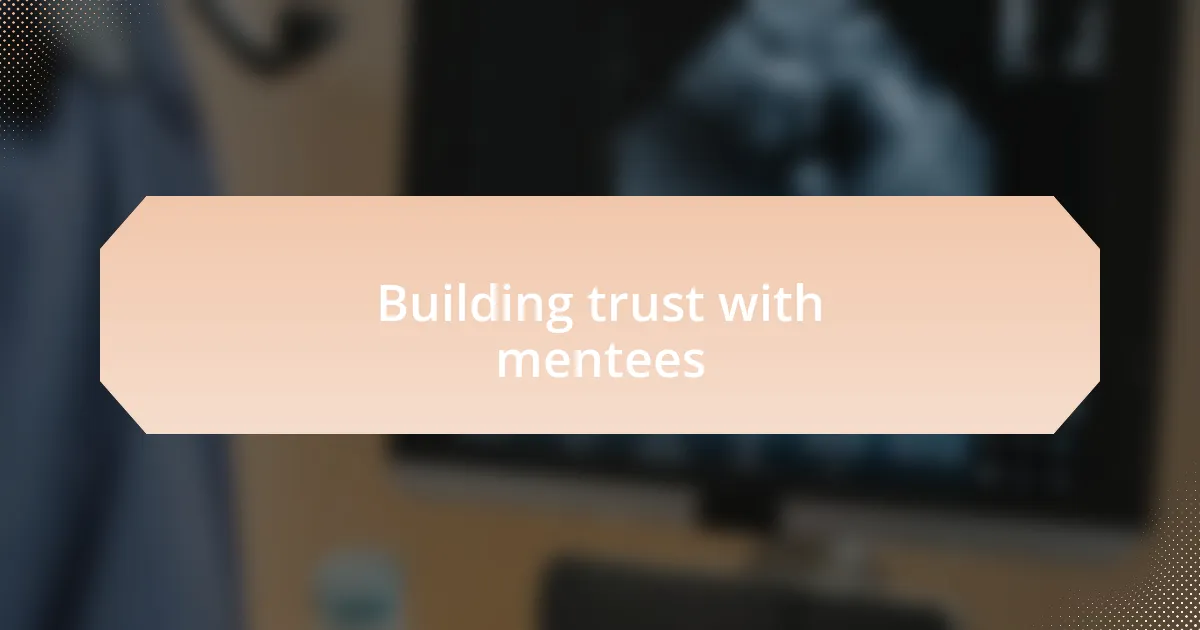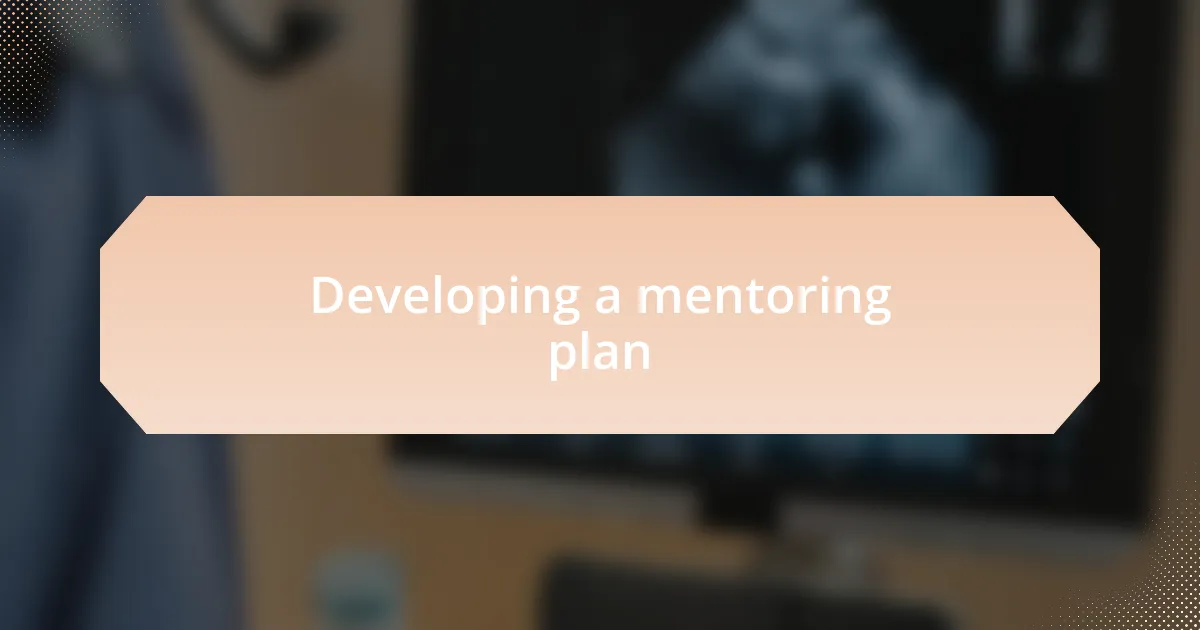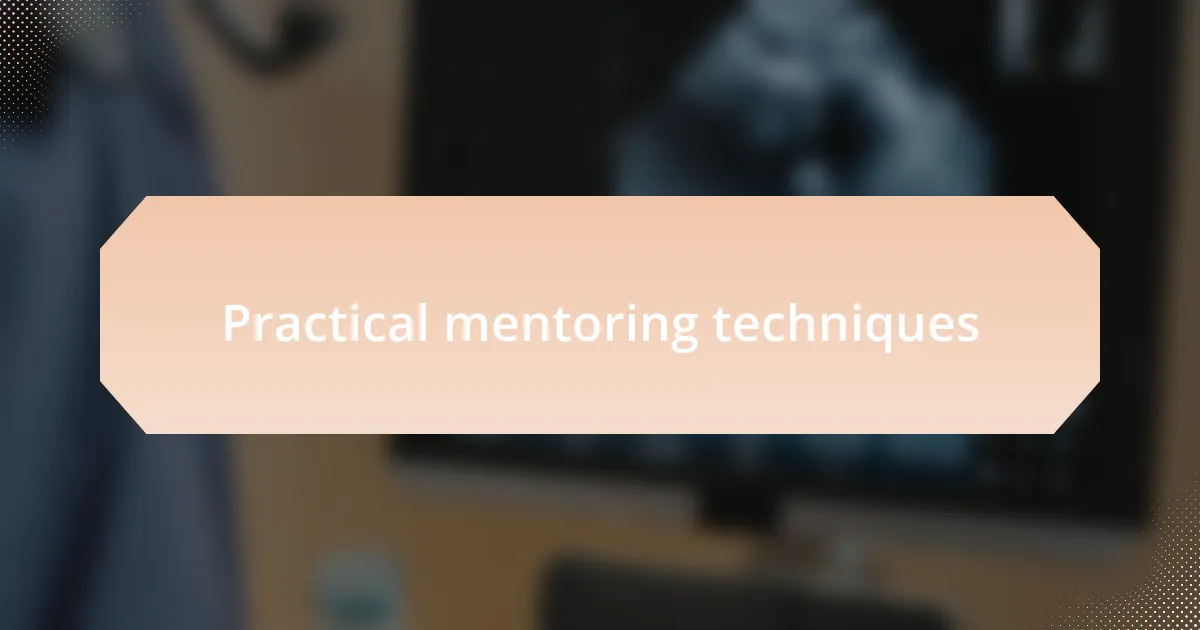Key takeaways:
- Hospital ministry provides essential emotional and spiritual support to patients and families during challenging times.
- Effective mentoring in ministry involves active listening, adaptability, and fostering a supportive community.
- Building trust with mentees is crucial, requiring vulnerability, consistent communication, and respect for confidentiality.
- Regular evaluations and feedback loops ensure that mentoring relationships evolve and remain beneficial for both mentor and mentee.

Understanding hospital ministry
Hospital ministry is a unique outreach that addresses the spiritual and emotional needs of patients and their families during some of life’s toughest moments. I remember the first time I stepped into a hospital room to offer comfort; the palpable mix of fear and hope in the air was overwhelming yet profound. It made me realize that being present in such vulnerable times can provide solace that often transcends words.
The role of a hospital minister often involves active listening and compassionate presence rather than delivering sermons or religious messages. Have you ever noticed how a simple, reassuring smile can break through the heavy atmosphere of a hospital? In those quiet moments, it becomes clear that the healing process is not just physical. Emotional and spiritual support can be just as crucial for recovery and resilience.
Diversity in care approaches is vital in hospital ministry, as every patient comes with their unique stories and beliefs. I recall meeting a patient who found comfort not in traditional prayers but in the conversation we shared about life, faith, and personal struggles. It struck me how essential it is to connect with individuals on their terms, honoring their backgrounds and providing a safe space for open dialogue.

Importance of mentoring in ministry
Mentoring in ministry is essential for fostering growth and resilience among both new and seasoned spiritual caregivers. I remember mentoring a fresh volunteer; her enthusiasm was infectious but filled with questions and uncertainties. Guiding her through the complexities of patient interactions not only bolstered her confidence but also deepened my own understanding of the ministry’s impact.
Moreover, a strong mentoring relationship can bridge generational gaps in ministry practices. When I mentored a more experienced chaplain facing changes in healthcare dynamics, we exchanged insights that illuminated both traditional and contemporary approaches. Reflecting on each of our experiences allowed us to grow collaboratively, ensuring that our ministry remains effective and relevant.
Finally, mentoring cultivates a supportive community within the ministry that empowers everyone involved. During a particularly challenging month, I reached out to my mentees for support, and their fresh perspectives uplifted my spirit and renewed my passion. Have you ever found solace in those you mentor? It’s a powerful reminder that alongside formal roles, mentorship nurtures relationships that can sustain us through the emotional demands of hospital ministry.

Key qualities of effective mentors
Key qualities of effective mentors stem from their ability to listen and empathize with those they guide. I vividly recall a time when a mentee confided in me about feeling overwhelmed by the emotional demands of their role. Instead of jumping to solutions, I chose to actively listen, allowing them to express their feelings fully. This not only helped build trust but also made them feel valued and understood, illustrating the power of empathetic listening in mentoring relationships.
Another essential quality is adaptability. Each mentee brings unique challenges and learning styles to the table. I remember working with a volunteer whose approach was more hands-on than theoretical. By recognizing their learning preference and adjusting our sessions accordingly, I could help them grow without imposing my own style. This flexibility is crucial in mentorship; it demonstrates respect for individual journeys while still guiding them toward growth.
Effective mentors also exhibit a genuine passion for development—not just their own, but also for those they mentor. One of my most fulfilling experiences was when I helped a student navigate the complexities of end-of-life care discussions. Witnessing their transformation and eagerness to learn fueled my passion for mentoring. Are you ready to ignite that same fire in your mentees? A mentor’s enthusiasm often becomes the catalyst for a mentee’s growth and commitment to their ministry, creating a ripple effect of positivity.

Building trust with mentees
Building trust with mentees is foundational for a successful mentoring relationship. I once partnered with a young woman who had just entered the hospital ministry field. In our first meeting, I shared my own vulnerability about the challenges I faced early on. By being open about my struggles, I noticed her walls starting to come down, which allowed for a more authentic connection.
Another aspect of trust is consistency in communication. I make it a point to check in with my mentees regularly, even when we don’t have scheduled meetings. It’s incredible how a simple message can show that I genuinely care about their progress and well-being. This consistent engagement fosters a sense of security, making them more likely to open up and share their own experiences and challenges.
I also emphasize the importance of confidentiality in our discussions. There was a time when a mentee shared deeply personal feelings about their faith crisis while navigating their role. I assured them that our conversation would remain private, which strengthened their trust in me. But what if I hadn’t respected that confidentiality? Reflecting on this, I realize that such promises are not just words; they are the bedrock of trust that allows for growth and transformation within the mentoring experience.

Developing a mentoring plan
To develop an effective mentoring plan, start by establishing clear objectives. When I first initiated a mentoring relationship, I took the time to outline what both my mentee and I hoped to achieve. I remember asking, “What do you envision for yourself in this ministry?” This simple question opened the door for an honest dialogue that shaped our shared goals, ensuring we were both aligned on our journey together.
Next, I believe in tailoring the approach to each individual. In one of my experiences, I had a mentee who thrived with hands-on learning. So, we structured our meetings around real-life scenarios, allowing her to apply concepts directly in the hospital environment. It made me realize that flexibility is critical; understanding how your mentee learns best can significantly impact their growth. Have you considered what learning style resonates with those you mentor?
Finally, I incorporate regular evaluations of our mentoring plan. I once scheduled monthly check-ins to discuss our progress and adjust our strategies. During these sessions, I asked open-ended questions like, “What challenges are you facing?” or “How can I better support you?” These reflections not only enhance the mentoring relationship but also encourage accountability. It’s about evolving together and ensuring that the plan remains relevant and beneficial.

Practical mentoring techniques
One practical mentoring technique I find highly effective is role modeling. I recall a particular instance when I shared my own experiences of dealing with difficult patient interactions. I invited my mentee to observe me during a challenging case, allowing her to see firsthand how I navigated communication strategies. This not only provided a learning opportunity but also sparked dialogue about our emotions during those moments. It made me wonder, how often do we take the time to show rather than just tell?
Another approach I cherish is fostering a safe space for vulnerability. During one of our sessions, my mentee opened up about her fears of inadequacy in the ministry. I empathized with her by sharing my own past doubts, creating an environment where we could explore these feelings together. This nurturing interaction deepened our connection and made her feel understood. Have you considered how your willingness to share your struggles could impact those you mentor?
Pairing direct feedback with encouragement is another technique I regularly employ. I remember when I critiqued a presentation my mentee gave; instead of just highlighting areas for improvement, I ensured to celebrate her strengths too. By balancing constructive criticism with positive reinforcement, I witnessed her confidence soar. Isn’t it inspiring how a few encouraging words can transform someone’s perspective on their abilities?

Evaluating mentoring relationships
Evaluating mentoring relationships requires regular check-ins to assess both progress and personal growth. I remember a time when I scheduled a reflective session with my mentee after six months of working together. We discussed our achievements and the challenges faced, which not only reinforced our bond but also highlighted areas needing further development. How often do we pause to reflect on these relationships?
Another crucial aspect is the importance of feedback loops. I always make it a point to ask my mentee how she feels about the mentoring process. During our discussions, she revealed that some of the techniques I used were helpful, but others felt overwhelming. This honest exchange not only helped me adjust my approach but also empowered her to voice her needs. Doesn’t it make sense that we are continuously evolving together?
Lastly, I find that measuring success in mentoring isn’t just about achieving goals but also about emotional growth. When my mentee confronted a difficult situation with a patient and shared her experience with me afterward, I could see how much she had grown. Her newfound confidence spoke volumes about the relationship we had built. Wouldn’t you agree that true success lies in the emotional strides made along the journey?